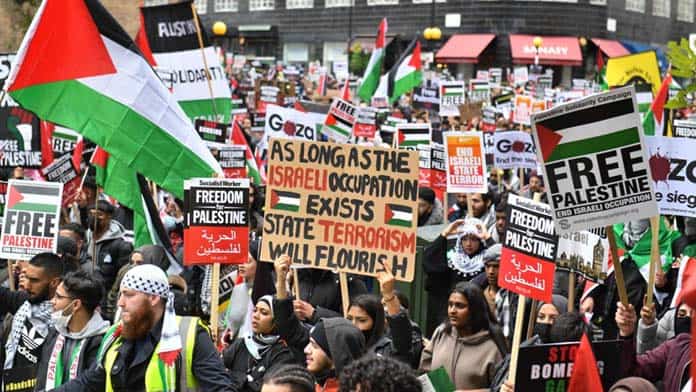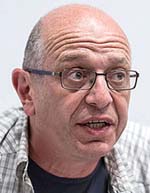Antisemitic incidents are on the increase in Australia. The Executive Council of Australian Jewry’s latest report on antisemitism records 331 incidents in 2020, well above the average for previous years.
Reported incidents of physical assault doubled, along with increases in direct verbal abuse, harassment, and intimidation and threats by post and phone. Socialists are fierce opponents of all forms of racism whether against Indigenous people, migrants, Muslims or Jews.
Prime Minister Scott Morrison declared in October that “antisemitism has no place in Australia. It has no place anywhere in the world”. But he was doing so as he announced that Australia would “embrace the definition of antisemitism doctored by the International Holocaust Remembrance Alliance” (IHRA).
Far from helping the fight against antisemitism, the IHRA definition has been weaponised to outlaw serious criticism of Israel, and to smear those who support the Palestinian struggle.
Rob Ferguson is an anti-racist activist and a member of the Socialist Workers Party in Britain who has written widely on the use of the IHRA definition. He spoke to Solidarity’s David Glanz.
The Holocaust is a part of your family history. Can you tell us about your background?
My mother left Hungary in the mid-1930s, and thus escaped the Holocaust. Members of my mother’s family did not, including her sister, my Aunt.
My father’s parents came from what was called the Pale of Russia, now Ukraine, Lithuania and Poland.
Both my parents went to Palestine in the 1930s. My father went as a socialist Zionist, but his socialist beliefs and his Zionism came into conflict. He left Palestine and came back to Britain, and became active in the Communist Party. The lesson my parents drew from the Nazi period was an uncompromising solidarity with the victims of racism, wherever they might be, supporting the civil rights movement in the United States and the anti-apartheid marches.
Here in Australia Nazi groups are still small, but they have been growing in confidence. How would you characterise the global threat from the far right?
It’s important to understand the conditions in which the far right have risen. We have seen a gathering crisis of the economic system, and a political crisis of the neo-liberal centre. Both the Social Democrats and the conservatives have seen a massive decline of their voting support. This is against the background of the financial crisis of 2008, the impact of the pandemic, and decades of austerity and neo-liberalism.
This has led to political polarisation. We’ve seen the rise of radical left movements and parties such as Syriza, and in Britain, Jeremy Corbyn and the Labor Left. But we’ve also seen the rise of the right, from Trump in the US, to far right street movements and fascist movements.
At the moment, the right have made the most gains. When we look at the far right, there are different types of movements. You have hardcore neo-Nazis, who have begun to raise their head in Australia; what are termed euro-fascists, who convey an image of electoral respectability, but are using it to build a fascist organisation.
You have right-wing populists, like Trump or Viktor Orban in Hungary, and finally street movements. In Britain we had the English Defence League, mobilising at their height tens of thousands against the supposed threat of Islamic extremism.
Their support base can move between these different groups. The right-wing populists commanding positions of government lay the ground for other forces on the right. And that’s the real danger.
The main driver for the rise of the far right has been the tide of Islamophobia and anti-Muslim hate.
France is a very important example, with the rise of Marine Le Pen, and what is now called National Rally, beforehand the Front National. Her project was to detoxify the Front National and establish a respectable electoral platform for fascist organisation.
They’ve pulled the whole of the mainstream to the right, into Islamophobia and anti-migrant narratives. The political centre, not least Macron, has led a charge against Muslims over the veil, banning Muslim organisations that monitor hate crimes and so forth.
We’ve now seen the emergence of [Presidential candidate] Eric Zemmour, openly espousing the most foul fascist and neo-Nazi positions—the idea of the “great replacement”, of the French nation being undermined by globalists bringing in Muslim migrants.
Opposition to antisemitism is important in and of itself. But the threat of antisemitism is part of the wider threat of racism and oppression in society as a whole.
The so called “great replacement theory” uses code terms which encourage overt antisemitism. This brings us back to the IHRA’s definition of antisemitism, which is rapidly becoming the establishment’s common sense view.
It’s important to look at the IHRA in context. It was adopted in May 2016, but against the background of an ideological offensive that took off in the early 2000s against what was called the new antisemitism.
Its premise is that a new threat to Jews has now emerged, equivalent to if not greater than the threat from the right, in the anti-imperialist left. In the 1960s the narrative was directed at the anti-imperialist wing of the anti-Vietnam War movement, the New Left and the anti-colonial Black power movement.
From the early 2000s the main target across Europe and North America were Muslims.
After 9/11 and the invasions of Afghanistan and Iraq, the war on terror came home, in the idea that Muslim communities were a suspect population. The left were presented as the allies of the Islamists in what was called a Red-Green Alliance.
The IHRA definition has never been invoked against examples of right-wing antisemitism. Indeed, a good number of its signatories are governments who are notoriously antisemitic, Hungary being one.
The IHRA definition itself is only three lines or so. Then it lists 11 examples. A couple are uncontroversial, opposing calls for aiding or justifying the killing or harming of Jews, for example.
But one key example is: “denying the Jewish people their right to self-determination by claiming that the existence of a state of Israel is a racist endeavour.”
This clearly aims at discrediting a whole body of historical work, and the narrative of Palestinian freedom, that defines Israel as a settler colonial state, and therefore whatever the intentions, inevitably a racist endeavour.
A second is, “applying double standards by requiring of Israel a behaviour not expected or demanded of any other democratic nation.”
The accusation is continually levelled whenever criticism is made of Israel, of why are you singling out Israel? What about all the other states that oppress populations in different ways? This is really a sleight-of-hand. The argument echoes the responses made by those who defended apartheid in South Africa: ‘What about all the Black dictatorships across our borders, why don’t you attack them?’
The left and the anti-colonial movement has always focused on those anti-colonial, anti-imperialist struggles that act as a focus for the wider struggle for against oppression, and for national freedom: Algeria, Vietnam, South Africa.
This is part of a focus on the struggles that not only demand solidarity in themselves, but focus opposition against our own rulers and against the wider system of national oppression on which imperialism depends.
The revolt across the entirety of historic Palestine last May evoked demonstrations and protests in solidarity with Palestine on a global scale.
It came against the backdrop of the Israeli human rights organisation B’Tselem bringing out a report in January that labelled Israel an apartheid regime, followed by another report by Human Rights Watch also using the label of apartheid.
This is important in understanding the drive behind the IHRA definition. The Zionists have huge difficulty when it comes to winning the argument. And therefore they have to impose restrictions on free expression and solidarity with Palestine from the top down through institutions of state, the administrations of our universities and so on.
For five years we have seen a massive offensive against Jeremy Corbyn and the Labor Left over false charges of antisemitism.
The Corbyn leadership team never confronted the attacks politically, to insist that the conflation of anti-Zionism or criticism of the state of Israel with antisemitism was a false conflation.
We’ve seen concession after concession unfortunately, and the Labour party adopted the IHRA definition itself in 2018.
The key battleground has become the university campuses. In Britain the demand from government that the IHRA definition be adopted was not popular amongst university administrations.
A very important focus for the [Palestinian] movement is defending free expression against attempts by the state [to use the IHRA definition to] limit the freedom of protest and expression. This kind of approach has a wider appeal.
To win the widest base of support, opposing the IHRA definition should not be made conditional on whether you are anti-Zionist or support a particular view on Israel and Palestine.
It simply has to insist that it is not antisemitic to advance an anti-Zionist position or support BDS.
To give an example, the administration at University College London adopted the IHRA definition without consultation. There was a long campaign to fight this.
The academic board then met to discuss it and the vote was overwhelming against the adoption of the IHRA, because the argument was conducted this way.
That vote [did not come from] academics who are anti-Zionists. UCL is overwhelmingly a medical institution. Everywhere this strategy has been adopted we’ve won.
I think the Zionists, nonetheless, will press the attacks [against free expression over Israel] as far as they can. You’ve seen in Britain the sacking of an academic at Bristol University, Professor David Miller, recently, [for making criticisms of Israel.]
By building a broad opposition to the IHRA, and [defending] free expression and free speech, we can engage with a wider audience than might otherwise be the case, and then argue about the issues around Palestinian freedom, Israel and Zionism. We need to raise Palestine solidarity everywhere that we can reach.
Listen to the full conversation below.
A number of useful resources are mentioned in the podcast. They are:
The Jerusalem Declaration on Antisemitism
British Committee for the Universities of Palestine (BRICUP)







